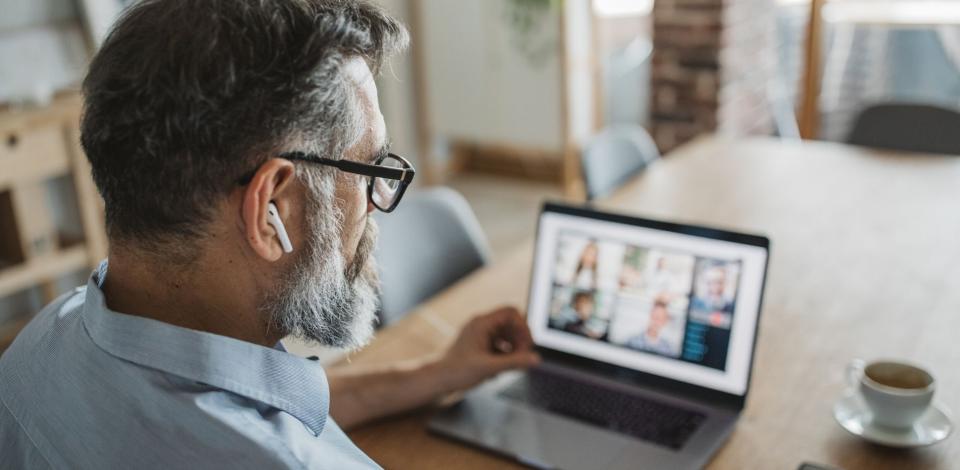Workplace Safety for Remote Workers
Tips for avoiding physical and mental injury while working from home

Working remotely has many benefits: no commute, more family time, and the comforts of home. But it also comes with drawbacks. Body aches, eye strain, mental fatigue, overloaded electrical outlets, cybersecurity threats, and emotional exhaustion will all eventually take their toll if left unmanaged. Here are some tips to manage the potential health and safety risks of working from home and avoid any physical and mental injury while promoting overall well-being.
Set Up an Ergonomic Workstation
Whether you’re moving around the house or at a single work area, it's imperative to minimize strain on your body to prevent injuries. Ergonomics is the optimal state of efficiency and physical comfort, and it is the key to minimizing bodily strain. The five key ergonomics principles are:
- Relaxed shoulders.
- Supported lower back.
- Level head.
- Straight wrists.
- Supported feet.
While working from home, it is essential to keep these five items in mind. Always try to maintain a neutral position, whether you're sitting stationary at a table or moving around to work on a more hands-on project. Your body should be aligned in a natural straight line as much as possible, avoiding long stints in twisted positions. When working on your computer, make sure your chair, table, and desktop monitor are all positioned in such a way that you are not straining your back, neck, or eyes.
Protect your Mental Well-being
Ergonomics are an important piece of physical health, but it is only part of the full picture of your well-being. Taking time to exercise, eat well, and enjoy time away from screens are all essential to protect your mental well-being.
- Rest often and take breaks. Rest is the most important asset to a successful job. Without it, good ergonomic practices are not only less meaningful, but also less maintainable. Get proper rest each day and night and remember to take regular breaks from working throughout the day. Varying your tasks will also help you avoid overworking yourself without thinking.
- Detach from negative news and focus on the facts. Stable mental well-being is essential to productivity. One way to protect this stability is to remove your focus from any source of stress. Do not completely ignore the problem, just take periodic breaks from dwelling in it, as that will only draw your mind into a spiral of negativity. When you return your focus to a stressful event, remember to put aside emotions and avoid going down a slippery slope of hypotheses or assumptions. Focus only on the facts and take them one at a time. This will help you take in the situation calmly and carefully, without mental overload.
- Focus on constructive activities and create boundaries. It's important to foster mental and emotional growth outside of work and news. Focus on constructive goals such as physical fitness and social connections to boost your mental and emotional state while establishing a sense of accomplishment and connectedness. Additionally, creating digital boundaries will help you manage your daily to-do's more effectively and positively by providing more structure to your day.
Prevent Cybersecurity Risks
While technology has made telecommuting easier, it also presents increased opportunities for cybersecurity vulnerabilities. Remote work environments usually don't have the same safeguards as in the office, so it's even more important to practice good cybersecurity hygiene.
- Keep your software protected and up to date. Update your software frequently, so that you know you have the latest and best security measures installed. Make sure you have anti-virus software and create strong, varied passwords (with two-factor authentication, ideally).
- Watch out for public threats. There are several ways a cyber threat can infiltrate your system, even with the above precautions. Be wary of potential phishing emails, and avoid using public WiFi—hackers can get into your system far more easily if you share the same network. Use a VPN or a personal hotspot instead.
Check Your Home Office for Safety Hazards
Your home often represents a place of comfort and security, which means that potential safety hazards can often be overlooked. With the increased use of electrical equipment, such as laptops, tablets, and phones, it's even more important to identify potential risks and follow best practices to minimize the safety hazards. To protect yourself against any such electrical danger, heed these recommendations from the Electrical Safety Foundation International:
- Don’t overload outlets.
- Unplug appliances that aren’t in use to save energy and mitigate the risk of shock and fire.
- Regularly inspect electrical and extension cords for damage. Use extension cords only temporarily.
- Never run cords under rugs, carpets, doors, or windows. Make sure cords don’t become tripping hazards.
- Keep papers and other possibly combustible items at least three feet away from space heaters and heat sources. Don’t plug space heaters or fans into an extension cord or power strip.
- Use proper wattage for lamps and lighting.
- Test your home’s smoke alarms monthly, change their batteries annually, and replace units every 10 years.
Prioritizing Safety in Remote Work
In the midst of any challenging situation, protecting yourself against potential physical and mental hazards will help to decrease your chances of burnout, isolation, and injury.
As a remote worker, it's your responsibility to ensure you've created a space to work that is safe and healthy for you. This means adjusting to the challenges posed by working from home, regularly checking in with yourself and your team, and maintaining a positive outlook for the future.

